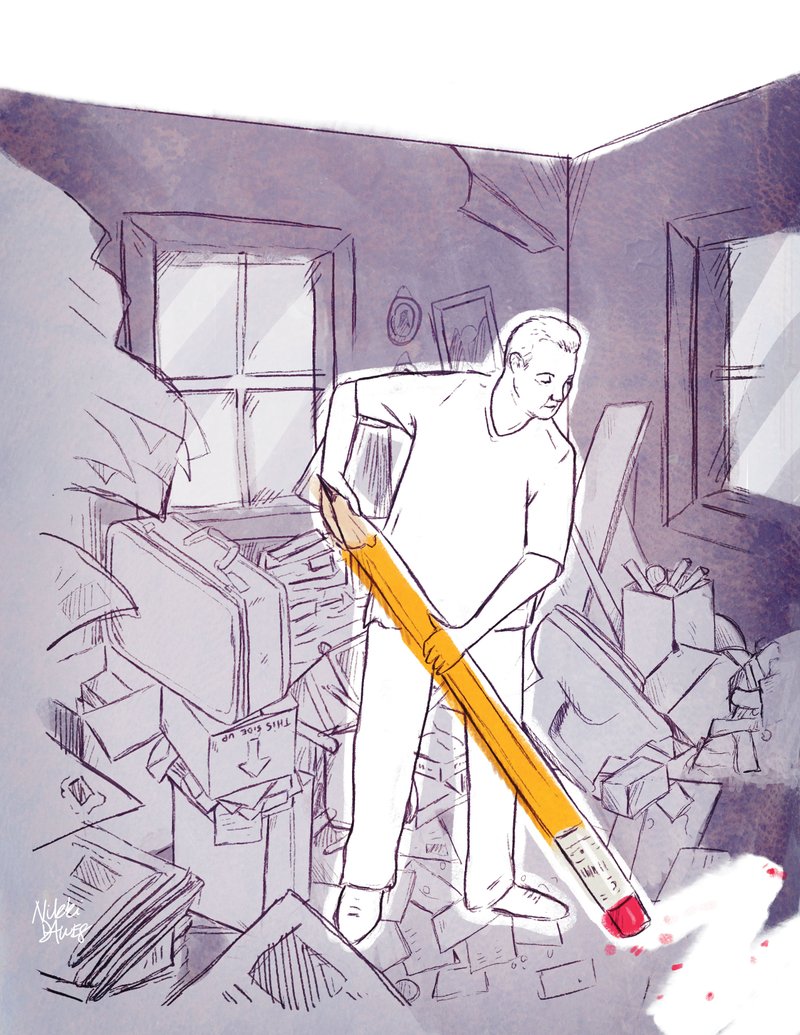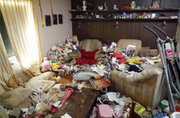The prospect of sorting through roomfuls of floor-to-ceiling stuff is daunting at best, paralyzing at worst.
According to a 2008 Johns Hopkins University study, an estimated 13 million Americans actively struggle with hoarding disorder, but hoarding affects several times that number. Eventually family members, landlords and homebuyers will be tasked with cleaning hoarders' homes.
RELATED STORY
PART I: A hoarder knows she needs help — but when she is ready
If you are facing this challenge, read on -- we've collected tips from professionals and amateurs who have successfully tackled the big clean.
Be compassionate
If the home-dweller is involved, "The person doing the cleaning has to absolutely have the deepest amount of compassion," says Matt Paxton, author of a do-it-yourself cleaning guide, The Secret Lives of Hoarders: True Stories of Tackling Extreme Clutter, and host of Lifetime's Hoarders: Family Secrets. Through the companies Clutter Cleaners and ServiceMaster Clean, he has cleared more than 2,000 houses.
"It's not a choice. ... Something bad has happened to them, and that's how their mind deals with it," he says. He advises against the common mistake of attempting to motivate via an ultimatum.
Sheila Jo Kornblum, a licensed clinical social worker in Rogers, says many hoarders have intimacy issues and may further isolate themselves when faced with familial animosity.
"And if you clean without the person's permission, the reactions are going to be panic and anger," she says.
Paxton prefers a small cleaning crew, usually about four people. "The hoarder needs to have everybody in their sight. They need to be in control, even visually," he says.
"A hoarder's biggest fear is that someone will judge them," says Trent Grubbs, with Arkansas Crime Scene Cleanup. "I have to meet with the hoarder numerous times to build that level of trust and rapport."
Paxton's team undergoes 40 hours of initial training. In addition to safety measures, this training covers effective communication tactics.
"There are very specific words you must use, specific ways you should stand, a way you should shake hands," he says. "There's a way you pick up an item, how you show it to a hoarder," in order to minimize the emotional trauma of cleaning.
He targets "easy rooms" first, such as a laundry room, that may contain fewer sentimental objects.
Protect yourself
"We have what we call clean hoards and dirty hoards," Grubbs says. "Clean hoards just have stuff. ... Dirty hoards, they hoard trash. Anything they eat, the containers just get set down. You'll have food, pet food, cans everywhere."
Zack Dryden got a great deal on a Hot Springs house that was so full, its former occupant had moved to a camper in the yard. Before cleaning, he bought a military-grade respirator and protective coveralls -- important items, as it turned out. It took Dryden and an assistant two weeks to clean the 750-square-foot space, where they encountered insects, mold, human and animal waste, rodents and rotting garbage.
"Be prepared to see things that you never thought could happen," Dryden says. "Be prepared to see stuff that will turn your stomach."
Rodents are particularly problematic, since they sometimes carry a deadly airborne pathogen called hantavirus. (Arkansas had one reported case in 2014.) But there may also be poisonous spiders and the occasional errant snake, so at the least, cover your limbs and wear solid shoes, advises Grubbs.
Other protective measures: surgical gloves, caps, booties and perhaps a tetanus booster.
Pace yourself
Grubbs often reminds his crew, "It's a marathon, not a sprint." The size of his crew differs from job to job, but the average house takes Arkansas Crime Scene Cleanup three days to a week to finish.
For Paxton, it "usually takes four to six days to clean out a house, if you're going full time. But that brings up an even more important issue -- can your client, can the hoarder, actually handle eight hours straight? Sometimes all they can take is two hours."
If the client begins to grow frustrated and angry, he says, "That's not just them being stubborn. That's their mind saying, 'I need a break.'"
After a relative died, Renee Williams of Little Rock worked about 60 days, spread over six months, clearing a 3,000-square-foot house and six backyard storage buildings.
"When you have hoarding disorder, you may put a letter from the 1800s next to junk mail. So you really can't just grab a stack and throw it out," she says.
Grubbs cautions against back injuries. "Be careful, carrying so much stuff."
And, he says, "Hydrate and take breaks often. Heat is a problem. A lot of these houses don't have working air conditioners."
Paxton's system is, work 50 minutes, rest 10.
Remove yourself
Impatience is counter-productive. "If you can't be empathetic, maybe you're not the one who should be doing the cleaning," Paxton says.
And you have to know when to say when. Once his team was cleaning a two-story house. After sorting a few upstairs piles, they expected to see floorboards. Instead, they saw...more piles. The floor had disintegrated.
"We [were honestly] just standing on the top of the piles from downstairs," he says.
Paxton pulled his crew and consulted a structural engineer before continuing.
Eyes on the prize
"Don't look at the big picture. You will become so overwhelmed, despair will just crash down upon you. ... Maybe you've spent five hours, and you realize you've hardly made a dent in one room," Grubbs says.
"Take baby steps and arrange baby milestones," says Roy Dudley of Little Rock, who has sorted multiple hoarders' homes while seeking treasures for his estate sale business. "It may be that you clean out a closet today."
Separate and store
"Treat everything like it's gold. Just because you think it's trash doesn't mean it's trash," Paxton says. "That whole first day, you need to learn your family member's definition of 'trash,' 'keep' and 'donate.'"
He uses tarps rather than boxes, so that it is easier for the person with hoarding disorder to see the items in each pile.
Grubbs rents Dumpsters and sometimes a storage pod, unless there is a shed or barn that can be cleared the first day.
Williams tackled a guest house first, then used the empty space to store the family keepsakes she discovered.
"The key is visually removing something," Dudley says. "In the morning we take away a load of true trash. In the afternoon, we take a load of donations."
Have a system
"What really worked for me is to, without deviating, literally go from top to bottom, left to right. And have a recycle bag, a keep box and a give-away box," Williams says. (She ended up with six truckloads of recycling.)
"Don't stop and read every letter to decide if you want to keep it," she adds. She saved anything interesting and re-sorted the "keep" boxes last.
Dudley recommends having a box for odds and ends -- the lone handle or lid, "things that look like they're a part of something." In one house, his team assembled a valuable Victorian pickle canister from pieces spread over three stories.
"When my crew picks something up, they're going to look at it and say, does this look like it has real value or does it look like it might have sentimental value? If so, we'll set it aside in a box of keep stuff, or we'll put it in a sort pile, which we'll go through with the homeowner at the end of each day," Grubbs says.
Check the pockets
"Anybody over 75, they're hiding money," Paxton says. "You have to go through every pair of pockets, every cigar box, every dish and envelope." Once, his team found $68,000 stashed throughout the house.
Use small bags
"Recycling gets really heavy. Don't put it in garbage bags. No matter how strong they say they are, they're not," Williams says.
She suggests small plastic shopping bags, "because you won't fill them so heavy you can't lift them."
Make a list
"I always tell my people, when you hire us, you're hiring someone to make the easy and the medium decisions for you," Grubbs says. He asks his clients to make a list of specific items they'd like to uncover and genres of items they'd like to keep.
"Maybe they want to keep all of the National Geographic magazines because they think they're collectible. ... You have to pick your battles."
Save it for later
Grubbs cautions against trying to repair unearthed structural issues as you go, even though, eventually, repairs might be needed. Hoarders tend to neglect maintenance, in some cases because they're embarrassed for workers to see their homes or because the problem is inaccessible. In cases of leaks or animal waste, floorboards may need to be replaced.
Grubbs's general rule -- dog urine can be cleaned; cat urine can't.
Call a professional
"You don't need someone trained in biohazard cleanup. You need someone trained in hoarding cleanup, so that they don't throw away indiscriminately," Grubbs says.
He's referring to useful items and garbage, since it's illegal to toss some things (such as items contaminated with body fluids) in a household garbage bin.
And occasionally, you do need a biohazard team. "We once had someone who had hoarded a lot of things that were bad, but the family had the space decontaminated before we got there," Dudley says.
Carlette Anderson, owner of the Gentry-based biohazard cleanup company Arkdecon LLC, says it's unusual to be able to decontaminate a house prior to clearing it. "Usually the hazards are spread throughout," she says.
Her team looks for bird, bat and rodent nests and droppings, while also sorting items into salvageable, recycling, regular garbage and biohazard waste. They take animal waste to a regulated landfill, where managers know what's coming in and can make safer placement decisions.
Hoarding cleanup can be expensive. Arkdecon's rate varies from job to job, and Arkansas Crime Scene Cleanup charges $130 an hour for two technicians, plus additional fees for materials, disposal and travel. According to ACSC's website, homeowners' insurance may pick up the tab.
"There is no getting around it, it is hard, hot heavy work. ... We can do it in three days only because we're experienced," Grubbs says.
Dudley sorts for his clients, free of charge. "The hoarder sales I've taken, I knew they were hoarder sales going in, and I knew the reward was going to be deep," he says.
Paxton stresses the importance of seeking therapy. "If you don't do therapy and people just come in and throw your stuff away, you're going to hoard again," he says. "It's not a matter of if, it's when."
HomeStyle on 10/03/2015

